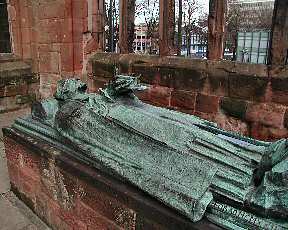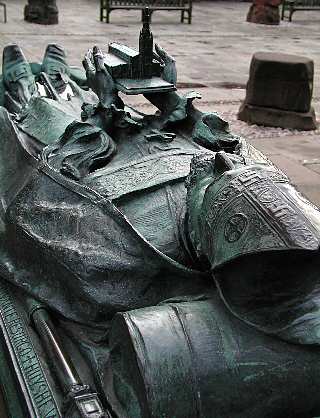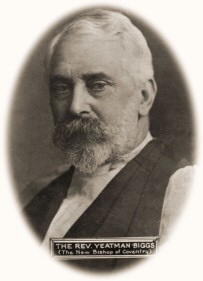|
Index...
|
 ere's a close-up of the world famous "Charred Cross". In the January after the Blitz, Reverend Howard asked the cathedral's stone mason, 'Jock' Forbes to make an altar from the rubble and place behind it a cross made from two charred oak beams that had fallen from the roof. Forbes obliged with a sublime piece of craftsmanship and this has become the focal point of the ruins ever since.
ere's a close-up of the world famous "Charred Cross". In the January after the Blitz, Reverend Howard asked the cathedral's stone mason, 'Jock' Forbes to make an altar from the rubble and place behind it a cross made from two charred oak beams that had fallen from the roof. Forbes obliged with a sublime piece of craftsmanship and this has become the focal point of the ruins ever since.

Before that, on the very morning after the blitz, a smaller cross was made by a local vicar Rev. A. P. Wales when he spontaneously picked up three of the large medieval nails, which had rained down upon the cathedral floor that night, and tied them with wire. This Cross of Nails was eventually placed upon the stone Altar of Rubble built two months later from fallen masonry.
From the moment that he made that simple cross, he was starting something altogether more profound than he probably imagined. A short time later, Rev. Wales presented Provost Howard with that cross of nails, but had meanwhile had it welded and chrome plated. From then on, Howard had as many of these crosses made as was possible using all the nails that were among the fallen rubble, (well over 100 altogether) and presented them as symbols of peace to Kings, Queens, Bishops and all manner of spiritual leaders around the world. Because of that, and all the subsequent hard work put in, Coventry became known as the Reconciliation Centre of the world.
These symbolic features, along with the words "Father Forgive" which Provost Howard insisted be inscribed on the wall behind the Altar, simply remind us all of the futility of war.
The cross on view today is actually a replica that was built in 1964 to stand in for the original cross which spent that year in New York spreading the message of peace around the world. The frail original is now kept safely in St. Michael's Hall below the new cathedral.

Beneath the huge window of the Lady Chapel, or Draper's Chapel as it was also sometimes known, lies the statue and tomb of Bishop Huyshe Wolcott Yeatman-Biggs who died in 1922 and was the first Bishop of the revived See of Coventry when St. Michael's became a cathedral in 1918.
This bronze tomb was the only thing within the cathedral to survive the blitz although one of the bishop's hands which holds a small model of the cathedral, was severed.

The repaired statue now resides near to where it used to belong in the centre of the chapel, which also carried the nickname of "Chapel on the Mount" owing to its unusually high position above ground level which becomes apparent when you enter the cathedral from the steps opposite the New Cathedral - the chapel being just to your left.
 Huyshe Wolcott Yeatman-Biggs c1918
Huyshe Wolcott Yeatman-Biggs c1918
Website by Rob Orland © 2002 to 2026